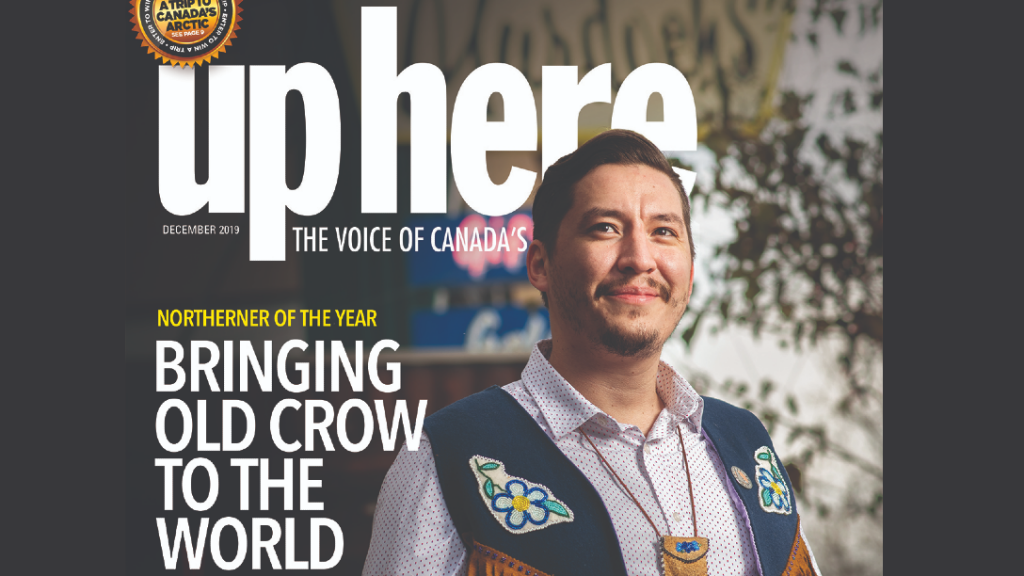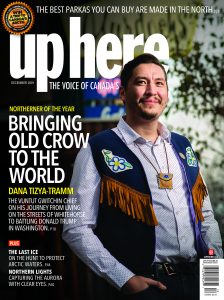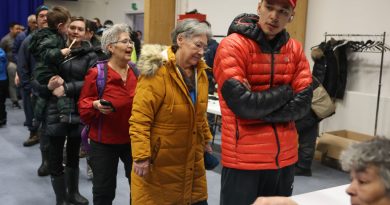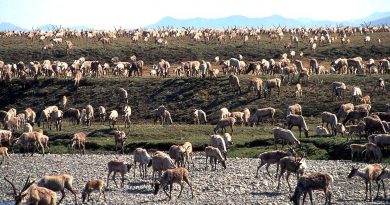Indigenous leader named Northerner of the Year by Canadian magazine

Dana Tizya-Tramm, chief of the Vuntut Gwitchin First Nation in Canada’s northwestern Arctic, has been named Notherner of the Year by Up Here magazine.
“In our Gwitchin culture, talking about oneself is bragging so it’s hard to talk about this kind of recognition,” said Tizya-Tramm when reached by Eye on the Arctic on Monday. “So instead, I see this recognition as being on behalf of my parents, my grandparents and my family. It’s about my people and about Yukoners. I hope it can be a conduit to inspire other people.”
Tizya-Tramm, elected chief in 2018, has been an outspoken voice and activist, both nationally and internationally, on everything from climate change to Indigenous rights. In 2019, he garnered headlines speaking out against plans by U.S. President Donald Trump to open the Arctic National Wildlife Refuge in Alaska for resource exploration, something many Gwitchin on both the U.S. and Canadian side of the border say would have a devastating effect on the Porcupine caribou herd that migrates between the two countries.
He also made headlines across Canada in May after declaring a climate change emergency in the Vuntut Gwitchin community of Old Crow.

“This is not just my story, this is the story of so many northerners”
Tizya-Tramm covers Up Here’s December issue, accompanied by a feature story where he opens up about his struggles with drugs as a teenager, being homeless in Whitehorse, the capital of Canada’s northwestern Yukon territory, and a suicide attempt at age 18.
Tizya-Tramm said he had no qualms about sharing so much of his life.
“This is not just my story, this is the story of so many northerners,” Tizya-Tramm said. “It’s not enough just to say the suicide rate among northern youth is 8 times higher than elsewhere. We have to ask: Why is it that way? What does it mean that it is that way?
“I wanted to share because it’s not just my story, it’s a story other Yukoners are going through right now, as we speak. But part of speaking out is selfish too, because when I tell my story, maybe it can help someone with what they’re going through and that is how I heal.”
Spotlighting northern interests
Up Here is a magazine based out of the city of Yellowknife in Canada’s Northwest Territories (NWT). It covers all three of Canada’s northern territories: Yukon, NWT, and Canada’s eastern Arctic territory of Nunavut.
The magazine has named a Northerner of the Year annually since its first issue 35 years ago. The recipient is chosen by the magazine’s editorial staff and publishers based on the person’s work to advance northern issues and change lives.
Tizya-Tramm is the second Northerner of the Year named from the Yukon community of Old Crow. Reverend Ellen Bruce, the first northern Indigenous woman ordained by the Anglican church, was named in 1987.
“Our Northerner of the Year is always one of the issues of which we’re most proud, and 2019 is no exception,” said Up Here publisher Marion LaVigne in a news release on Tuesday. “Chief Tizya-Tramm has a remarkable story and we thank him for sharing it with us, and all our readers.”
Write to Eilís Quinn at eilis.quinn(at)cbc.ca
Related stories from around the North:
Canada: Indigenous participation key to Arctic development, Inuit activist tells Economic Forum of the Americas, Eye on the Arctic
Finland: Teen protesters in Helsinki demand climate action, Yle News
Russia: Russia removes critical voices ahead of Arctic Council chairmanship, claims Indigenous peoples expert, The Independent Barents Observer
Sweden: Thousands in Sweden join Greta Thunberg for worldwide climate strike, Radio Sweden
United States: Protest, policy critiques mark first day of Alaska Federation of Natives Convention, Alaska Public Media




We would like to send Eilis Quinn some information about a dialogue series being held to examine “Permafrost Carbon Feedback”, or PCF. As the permafrost thaws, huge volumes of greenhouse gases are emitted. This is creating a very large problem for the rest of the world, as there are presently no ways to prevent PCF from growing. PCF untreated, is going to make the problems for the people of the north worse, and it’s possible that solutions (if there are any) could create some impacts which are good, and some which are not good. The Dialogues are to examine these issues. If Eilis were to see the material she could decide whether she would like to Observe the Dialogues, to run weekly for four weeks starting March 4th. Regards, Mike Brown